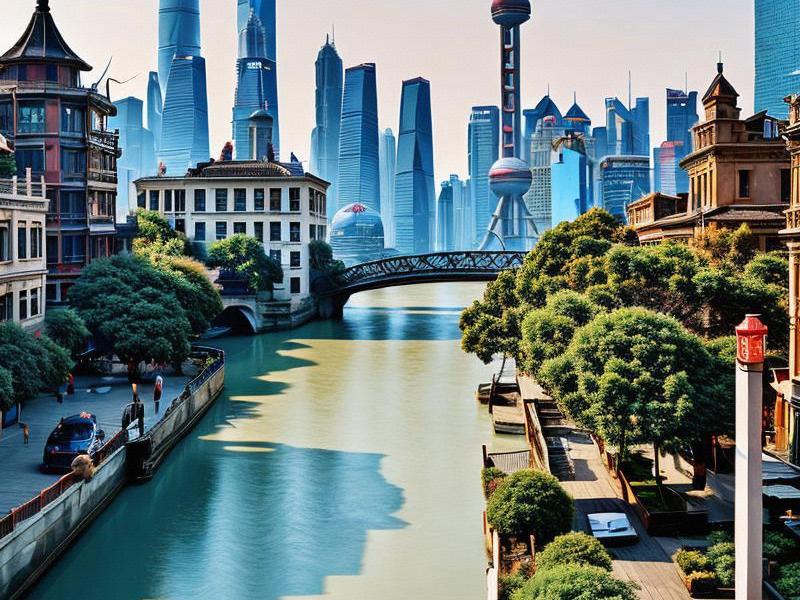This article delves into the multifaceted aspects of Shanghai, exploring its status as a global metropolis, its economic prowess, cultural diversity, urban development, and international influence. Shanghai, located at the mouth of the Yangtze River in China, is not only a symbol of China's reform and opening up but also a vibrant city that continues to attract global attention.

Shanghai, known as the "Pearl of the Orient," is a city that seamlessly blends tradition with modernity. Its skyline, dominated by iconic skyscrapers such as the Oriental Pearl Tower and the Shanghai Tower, is a testament to its rapid urban development and economic growth. However, beneath this modern facade lies a rich historical and cultural heritage that dates back thousands of years.
The history of Shanghai can be traced back to the Song Dynasty, when it was a small fishing village. Over the centuries, it grew into a major port city, thanks to its strategic location at the mouth of the Yangtze River. During the 19th century, Shanghai became a treaty port, opening up to foreign trade and influence. This period saw the influx of Western culture, architecture, and technology, which left a lasting imprint on the city.
Today, Shanghai is one of the world's largest and most dynamic cities, serving as a major financial hub and a global center for commerce, trade, and culture. It is home to the Shanghai Stock Exchange, one of the largest stock exchanges in the world, and hosts numerous international conferences and exhibitions, such as the World Expo.
The economic prowess of Shanghai is evident in its diverse industries, including finance, manufacturing, technology, and real estate. The city is a key player in China's economic development, contributing significantly to the country's GDP. Its well-developed infrastructure, including its efficient public transportation system, advanced telecommunications network, and world-class ports, makes it a hub for global trade and investment.
新夜上海论坛 Culturally, Shanghai is a melting pot of different traditions and influences. It is known for its vibrant art scene, with numerous galleries, theaters, and music venues showcasing both traditional Chinese art and contemporary international works. The city also hosts various cultural festivals throughout the year, such as the Shanghai International Film Festival and the Shanghai Fashion Week, which attract artists, designers, and audiences from around the world.
The architectural landscape of Shanghai is a blend of old and new. The Bund, a historic waterfront area, is lined with colonial-era buildings that offer a glimpse into the city's past. In contrast, areas like Lujiazui, the financial district, are home to some of the world's tallest skyscrapers, symbolizing Shanghai's modernity and ambition.
Urban development in Shanghai has been remarkable, with the city constantly striving to balance economic growth with environmental sustainability. Initiatives such as the construction of green spaces, the promotion of public transportation, and the implementation of energy-efficient technologies reflect the city's commitment to creating a livable and sustainable urban environment.
Shanghai's international influence extends beyond its economic and cultural contributions. It plays a crucial role in global governance and diplomacy, serving as a member of the United Nations and hosting various international organizations. The city's leadership in areas such as finance, trade, and technology has made it a key player in shaping the global agenda.
上海娱乐
However, Shanghai's rapid development has not been without challenges. Issues such as urbanization, environmental pollution, and social inequality need to be addressed to ensure sustainable growth. The city government has been proactive in implementing policies and initiatives to tackle these challenges, such as promoting green development, improving public services, and enhancing social welfare.
In recent years, Shanghai has also been at the forefront of China's innovation-driven development strategy. The city has established itself as a hub for high-tech industries, including artificial intelligence, biotechnology, and information technology. The Zhangjiang Hi-Tech Park, one of the largest technology parks in China, is home to numerous startups and research institutions, fostering innovation and entrepreneurship.
Education is another area where Shanghai excels. The city is home to some of the best universities in China, such as Fudan University and Tongji University, which attract students and researchers from around the world. These institutions play a vital role in driving innovation, promoting academic excellence, and contributing to the city's development.
爱上海419论坛 Tourism is a significant contributor to Shanghai's economy, with millions of visitors flocking to the city each year to experience its unique blend of history, culture, and modernity. Attractions such as the Yu Garden, the Nanjing Road shopping district, and the Shanghai Museum are popular among tourists, offering a glimpse into the city's rich heritage and vibrant lifestyle.
Shanghai's culinary scene is another highlight, with its diverse range of dishes reflecting the city's multicultural influences. From traditional Shanghainese cuisine to international flavors, the city offers a culinary experience that caters to all tastes. Popular dishes include xiaolongbao (soup dumplings), shengjianbao (pan-fried buns), and various seafood delicacies.
In conclusion, Shanghai is a city that embodies the spirit of China's reform and opening up. Its rapid urban development, economic prowess, cultural diversity, and international influence make it a global metropolis that continues to shape the future. As Shanghai looks ahead, it remains committed to sustainable growth, innovation, and global cooperation, ensuring that it remains a beacon of progress and opportunity in the 21st century.